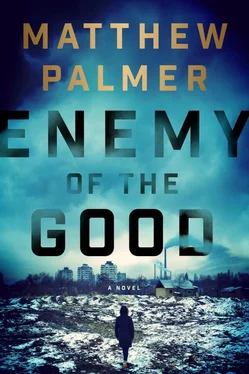Matthew Palmer
ENEMY OF THE GOOD
BISHKEK
MARCH 9, 2004
The basement was cool and damp and smelled of mildew and sour milk. There were only about twenty of them, hardly an army. The group included a few graybeards, but most were young, one or two of the boys barely old enough to shave. Zamira’s heart ached for the youngsters. She was almost fifty and if the secret police put a bullet through her skull tomorrow it would have been a rich and full life. The younger ones were risking so much more, even if they did not yet have the perspective needed to understand that, to recognize their own mortality.
The agents of the State Committee for National Security—the GKNB—were both ruthless and efficient. And they were getting closer. There were only a few places left in Bishkek where the steering group could meet. Temir, the owner of the restaurant, was a sympathizer, and despite the dangers he let them use the basement. There was something about meeting literally underground that was deeply satisfying. It was something primal from hunter-gatherer days, she suspected, the association of the cave with safety and security. But this was their third time in the same place in as many months. And the meeting had already gone on too long.
They called themselves Azattyk, the Kyrgyz word for “freedom,” and their ultimate goal was nothing less than the overthrow of the corrupt and despotic regime of Nurlan Eraliev. The one-time Soviet apparatchik had given himself the title President for Life. Some in the movement hoped that Eraliev would read the writing on the wall and flee to Moscow or Beijing to live out his final days in exile. Others in Azattyk were perfectly willing to accept Eraliev’s title at face value. As far as they were concerned, he was welcome to reach the end of his reign at the end of a rope, just as long as that day came soon. No one doubted, however, that they would succeed. No one but Zamira.
Zamira cast an appraising glance around the room. These were her comrades, her brothers and sisters in the struggle for a democratic Kyrgyzstan. But for most of them it was a game. Even now, after almost six months of planning, organizing, and skulking in the shadows, they had no idea what they were up against. What the thugs and enforcers of the GKNB would do to them if they were caught. They would learn, and hopefully not before it was too late.
A young man with pale skin, a neatly trimmed beard, and an old army jacket stood up, signaling for attention. His name was Fyodor. He was an ethnic Russian and the informal leader of their radical wing, Azattyk’s equivalent of the Young Turks. Hot tempered and impatient, soaked in testosterone, and stupid.
“Enough of this shit!” Fyodor said loudly. He drained his glass and slammed it upside down on the table. The Uzbeks and the Russians, Fyodor among them, were drinking arrak , a kind of local vodka. Zamira was Kyrgyz and most of her ethnic kin with their Asiatic features were drinking kumys , fermented mare’s milk. Zamira didn’t much like the taste, but there were those in the movement who still considered her foreign. She had lived most of her life in London, the daughter of dissidents who had fled Bishkek in the 1970s under suspicion—accurate, as it would so happen—of being Kyrgyz nationalists before nationalism in Central Asia was fashionable. Moreover, her sister, Cholpon, was married to an American diplomat. Azattyk’s lefty student leaders had no more time for the CIA than they did for the GKNB. So Zamira drank kumys more to establish her ethnic bona fides than to appreciate the salty, buttery flavor.
“Enough of this shit,” Fyodor repeated. “It is time to stop hiding in the shadows. We are ready to meet our enemy face-to-face on the streets of the city. It is time to stop organizing and start acting.”
There was a murmur of assent from the assembled. Fyodor’s was a popular sentiment. Azattyk was an underground movement that, so far, had done little more than spray paint furtive pro-democracy and anti-regime graffiti on buildings and bridges. The entire membership numbered no more than several hundred and they had so little money that the steering group had not even bothered to appoint a treasurer.
They were far from formidable, but the regime seemed to be afraid of them, or at least afraid of what they represented. And some of Azattyk’s less experienced members, which was to say almost all of them, had begun to believe their own PR.
“It is too soon. The security services would break us like a dry twig.” The voice of reason belonged to one of Zamira’s contemporaries, a chemical engineer named Chorobek Rustamov, who worked at the state-run fertilizer plant. Rustamov was smart and pragmatic, but he was blunt to a fault, and the younger members of the movement considered him hopelessly bourgeois, which for them was often a synonym for cowardly.
“Chorobek is right,” Zamira said, not giving Fyodor a chance to respond. “This is exactly what Eraliev hopes we will do: show ourselves before we are ready. We must build our strength before we come out of hiding. There will be only one chance at this. Fail and we will all be spending the rest of our short, miserable lives in Prison Number One.” This was where Eraliev kept his political opponents and those the regime considered enemies of the state.
Fyodor was not rolling over, however. He was clearly ready to fight his corner.
He would not get his chance.
There was a loud crack from upstairs. A gunshot. The room froze into silence. This was a rough part of town. On a typical Saturday night, gunfire would not have been especially noteworthy. But tonight, the restaurant was closed and empty. There was supposed to be no one upstairs except Temir. And Temir, Zamira suspected, was now dead. Reflexively, they all looked up as though they would be able to see through the concrete ceiling.
A series of dull thuds followed, moving across the floor above. Footsteps. Heavy and unconcerned with stealth. That could only mean one thing. There were many of them, enough that it did not matter especially if those below knew they were coming.
The twenty or so conspirators in the basement reached that same conclusion at almost the same moment, their thought processes supercharged by adrenaline, nicotine, and fear. The basement had a back door, a narrow set of crumbling cement stairs that opened up onto the alley behind the restaurant. The would-be revolutionaries dashed for the exit, tripping one another in their haste to reach the illusionary safety of Bishkek’s backstreets. All thoughts of comradeship were forgotten in the mad rush for the night air and the cloak of darkness. Zamira saw Mukhamed, a gigantic twenty-year-old ethnic Kyrgyz prone to bragging about his cat-and-mouse games with the secret police, shove a diminutive Russian girl named Ludmila to the ground, driven by an instinct for self-preservation inscribed in his DNA by millions of years of natural selection.
People were animals, Zamira thought. Herd animals mostly, but with a select few predators. People were both sheep and wolves. And civilization was a thin veneer that concealed nature red in tooth and claw. It was easier to slip the bonds of social norms than most people could imagine, and there was perhaps no society on earth that was more than two missed meals away from anarchy.
Zamira did not join the others in fighting for the stairs. The security services were professional and their agents were anything but dumb. The alley would be a trap.
Читать дальше













